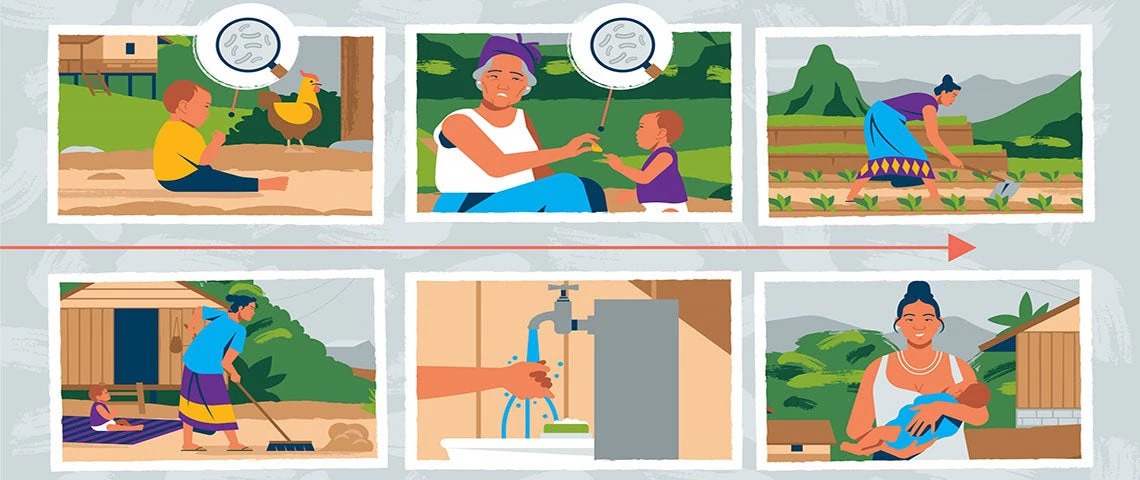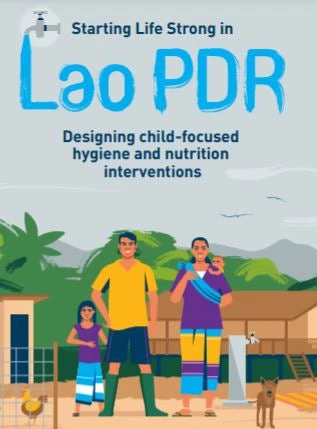 WASH Lao
WASH Lao
Poor nutrition and frequent infections among children can cause stunting, or impaired growth and development. Stunting limits children both physically and mentally and continues to affect their health and productivity well into adulthood. Lack of access to water, sanitation and hygiene (WASH), neglect, food insecurity, and feeding of low quantity, quality and diversity can magnify the effects of stunting. In the Lao People’s Democratic Republic, stunting affects around 40% of children under the age of five and the World Bank is one of many partners seeking innovative solutions that can urgently remedy this situation.
Can better water, sanitation and hygiene prevent childhood stunting?
To prevent disease, the WASH sector has traditionally focused on basic hygiene practices such as washing hands with soap, use of toilets, and the treatment and safe storage of water. However, young children in poor households can often be at risk of exposure to fecal-oral diseases through numerous other routes, not all of which are obvious.
An approach known as ‘Baby WASH’ aims to address these frequently overlooked environmental and personal hygiene risks by encouraging food hygiene, clean play spaces, control of animal feces, and child handwashing (Ngure et al. 2014). Baby WASH adapts traditional water, sanitation and hygiene approaches to a context of nutrition for young children , thereby moving nutrition beyond a focus on food to a more diverse backdrop of the areas that influence a child’s well-being, often in inter-connected ways.
Scaling up Baby WASH using Multi-Sectoral Convergence for Nutrition
The Lao government is implementing World Bank-supported projects on health, WASH, agriculture and social protection — all important for child nutrition — in four northern provinces, Xieng Khouang, Houaphan, Phongsaly, and Oudomxay. The Scaling-Up Water Supply, Sanitation, and Hygiene Project (SWSSHP) aims to contribute to nutrition outcomes by providing safe drinking water and sanitation services, along with activities to improve hygiene behavior in families, schools and health centers, with a focus on mothers of young children.
As part of SWSSHP, a study was undertaken to find out how fecal-oral diseases are transmitted in households with young children, and to design hygiene interventions that could reduce this risk. Initial findings indicated that many people did not follow traditionally promoted hygiene practices, such as washing hands with soap. Child caregivers showed limited awareness of the disease transmission risks associated with exposure to dirt and animal feces, and exclusive breastfeeding was not practiced consistently, because mothers needed to return to farm work.
Follow-up research to understand risk perceptions, attitudes, norms, abilities and self-regulation[1] found that caregivers who did not practice traditionally promoted hygiene behavior were less likely to perceive a risk in not doing so and did not link this to ill-health. They were also less conscious of differing peer attitudes and norms, and did not personally feel disgust at lack of cleanliness. They were unsure of their ability to carry out hygiene behavior, or even to remember to do so, and felt that such practices would require considerable effort.
Based on these findings, a set of activities was developed to target the barriers, attitudes and norms. Hygiene messages will be delivered through peer groups and channels such as mobile phones. The messages will also be promoted through the Bank’s Reducing Rural Poverty and Malnutrition Project, the Health Governance and Nutrition Development Project, the Poverty Reduction Fund, and the Health and Nutrition Services Access Project, using common Social Behavioral Change and Communication (SBCC) platforms.
By implementing an integrated package of interventions based on improved access to infrastructure and services, rather than using parallel interventions, this Baby WASH approach marks a departure from conventional nutrition-linked WASH SBCC. While its impact in Laos remains to be evaluated, it is expected to increase the effectiveness of project behavioral change activities.
Learn more about designing child-focused hygiene and nutrition interventions, download the brief and the graphic brochure.
Financial support for this work was provided by the Government of Japan through the Japan Trust Fund for Scaling Up Nutrition. Global Water Security and Sanitation Partnership (GWSP) also provided support for the work.
[1] The Risks, Attitudes, Norms, Abilities, and Self-regulation (RANAS) approach to systematic behavior change is an established method for designing and evaluating behavior change strategies that target and change the factors influencing a specific behavior in a specific population www.ranasmosler.com




Join the Conversation